The most promising Australian games at PAX AU
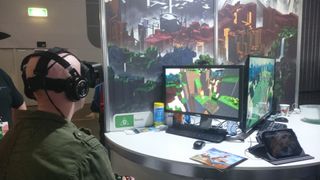
As one might expect of an event based in Melbourne, PAX Australia's sprawling indie floor was dominated by Australian developers. That's no surprise really, but in a country with few major video game conventions it's a rare opportunity to measure how the local scene is, um, developing.
There doesn't appear to be any unifying stylistic thread in Australia's development scene—at least, none was on display at PAX. The floor hosted a wide variety of styles and genres, ranging experimental shooters through to sprawling, procedurally generated space trading games. The games that follow are the ones that impressed me the most, and let me stress that these are upcoming games, explaining the absence of Armello, Assault Android Cactus, and Framed, among other local highlights.

Kieru
This is a strange one: a 2v2 first-person ninja deathmatch set in high contrast monochrome arenas. Developed by Canberra-based Pine Fire Studios, the build I played was pre-alpha and a bit buggy, but the concept is promising. Teams of white and black ninjas duke it out, with each encouraged to stick to the corresponding coloured areas in order to remain (mostly) unseen. Attacks are a forward dashing melee swipe of a sword, and traversal focuses on long leaps between rooftops. It's a unique idea (as far as competitive first-person games go), but it's the art style that grabbed my attention. See it in action here.
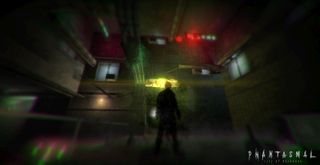
Phantasmal: City of Darkness
Eyemobi is a studio based in New Zealand, but like all good things based in New Zealand, Australians consider it Australian. Phantasmal: City of Darkness is currently in Early Access, but the build I played at PAX had Oculus Rift connectivity, and it worked well. A procedurally-generated first-person survival horror set in the now demolished Kowloon Walled City in Hong Kong, Phantasmal isn’t just about running away from things and managing scarce resources: like other Lovecraft-inspired horror games you also need to manage a sanity meter, and the higher it gets the more bleakly psychedelic the game becomes. In terms of VR implementation it was the best first-person game I saw at PAX.

Objects in Space
This is a meditative spaceship sim with a few twists: navigation steers closer to the essence of submarine sims, and the austere graphics recall the beautiful minimalism of early '90s Microprose games. The build I saw focused on combat—necessary on a busy showroom floor—but Objects in Space is billed as 'a modempunk space trading game' and the exploration places great emphasis on stealth. Developed by Flat Earth Games (Metrocide), it's expected to release next year. See it in action in this recent walkthrough trailer.
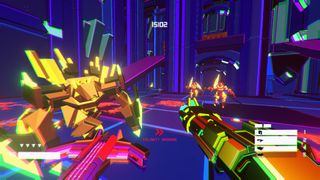
Desync
I wrote about Desync last week, but it's worth bringing up here again. A challenging arena shooter set in a stunning retro-futuristic world, Desync focuses on high-skill twitch-oriented shooting and the type of gunplay that might impress a ballerina. Its performative focus is confirmed by an unusually thorough leaderboard system, which tracks not only your score but nearly every aspect of your game. Desync will release some time next year through Adult Swim.
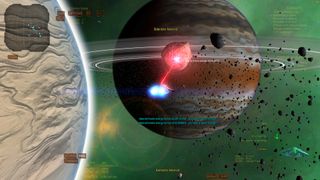
Ascent
This is a tricky game to 'assess' on a showroom floor, because according to the studio Fluffy Kitten, this space MMO has "more than 270 billion star systems generated with unique planets, mineral concenrations, agriculturual values and climate". That seems remarkably ambitious for a team dwarved by the likes of Roberts Space Industries or Frontier Developments, but the Early Access game appears eminently playable (and endlessly complicated) based on what I saw. The graphics are a little old fashioned and planetary exploration requires some imagination on the player's part, but the sim aspects appear well-honed, and the fact that this even exists is almost its own reward. I intend to spend a lot of time with it.

Hollow Knight
Cute 2D platformers need to work extra hard to attract any form of attention nowadays. Even as a huge fan of the genre I'm starting to feel burnt out by the dozens that pile up on Steam every week. So I approached the Hollow Knight stand cautiously, but came away intrigued. It doesn't boast any novel gameplay twists, but the handdrawn art style complements its roaming, adventurous spirit. Also, every death leaves a shadow knight which must be confronted and conquered in order to retrieve any goods lost upon dying. There's a lot of mediocre platformers out there, but Hollow Knight looks promising. Other people seem to think so too—it exceeded its Kickstarter funding goal by quite a long margin.

Marble Mountain
Marble Mountain is a pretty simple idea: navigate a marble through increasingly difficult obstacle courses, taking care to avoid rolling into the abyss. That's not very exciting, but what impressed most about Marble Mountain was its VR implementation. With its fixed camera angles that pan automatically as the player progresses, I was able to take in the world as a passive observer. For this reason I found Marble Mountain to be one of the most oddly relaxing and effective VR experiences yet, because the concept doesn't need to grapple with any of VR's many challenges (spatial awareness, motion sickness). It feels more like a 'toy' than a game. Marble Mountain is currently in Steam Greenlight, and you can check out the trailer here.
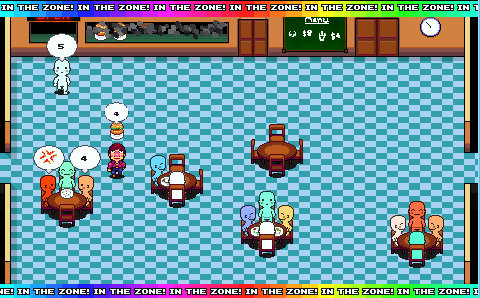
Knuckle Sandwich
Tom described Knuckle Sandwich as "a grown-up EarthBound" when he wrote about it months ago, and that sentence alone is likely to sell it to a bunch of people. For those unfamiliar with the reference though, Knuckle Sandwich is basically a 16-bit era topdown RPG, but it's set in the modern world and intent on conveying the mundane grind of daily existence. It's an interesting concept, and its lurid, colourful artstyle is definitely appealing, but what appeals most is the deadpan way the game melds fantastical RPG tropes with the comparatively bland modern condition.

Shaun Prescott is the Australian editor of PC Gamer. With over ten years experience covering the games industry, his work has appeared on GamesRadar+, TechRadar, The Guardian, PLAY Magazine, the Sydney Morning Herald, and more. Specific interests include indie games, obscure Metroidvanias, speedrunning, experimental games and FPSs. He thinks Lulu by Metallica and Lou Reed is an all-time classic that will receive its due critical reappraisal one day.
Most Popular

